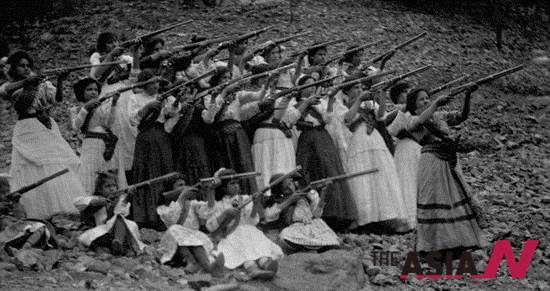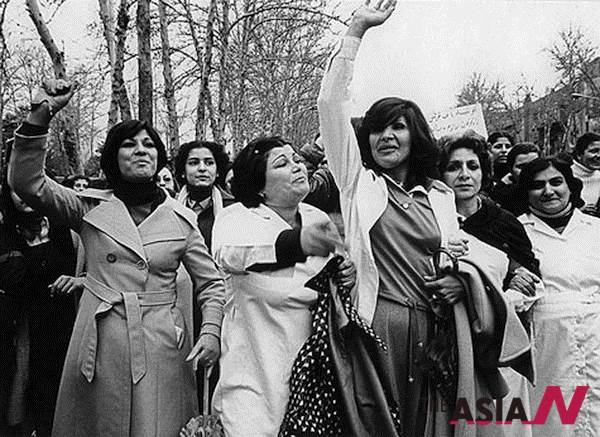Women in revolution
Women had an effective role in rebellions even in earlier revolutions like the French Revolution, Russian Revolution, and even in Arab revolutions. Women’s participation in revolutions started much earlier than 1000 A.D.; Cleopatra II of Egypt led a rebellion against her brother Ptolemy VIII and drove him and Cleopatra III out of Egypt; Queen Gwendolyn of Britain fought her ex-husband over the throne; Mother Lü of China began a peasant rebellion against Wang Mang, the Trung Sisters of Vietnam rebelled against the Chinese Han Dynasty; and Queen Zenobia of Syria led a revolt against the Roman empire and controlled most of their lands.
These examples and many more show that ever since the beginning of history, women were able to become leaders, maybe even better leaders of revolution than many men.
Women led rebellions and revolutions all over the world, which were mostly against invaders and cruel rulers. Women later on, starting from the 18th century were credited for their roles in food riots, especially in Ireland, Belgium, Holland and Germany.

A group of rebel women and girls wearing traditional dress practice their shooting skills for the Mexican Revolution in 1911.
They also had a notable role during the French Revolution, when they said that men were “cowards” and that they “will take over” and began their food riots and their march from Versailles with soldiers following behind. Women had a huge role once again in France, in overthrowing the monarchy. Women had their share of political activities during World War I in countries like Germany, Russia, Italy, Japan, Spain, etc. Even though their reasons differed, all these women were demanding for rights despite the cruel social and economic conditions.
Pivotal role in the ‘Arab Spring’
Women took part in other major historical events like the Russian Revolution, Spanish Civil War, right to vote marches in Britain, and eventually “International Women’s Day” was made to celebrate these women.
Later on, the introduction of feminism and the civil rights movements made women start asking for the rights they were deprived of due to racism and the denial of women’s role in politics.
Women in the Arab world do not enjoy the freedom of speech other women might enjoy. Women marches and asking for her rights is considered one of the taboos in many Arab countries. It is sad to witness women asking for permission to go out on a stroll and not even being allowed to drive, while in some countries women can become notable figures.
Although women participated in many Arab revolutions, the Egyptian 1919 revolution was the first revolution with men and women marching together, which is quite late, but is still considered an achievement. Women had a big role in the Arab Spring revolutions in Egypt, Yemen, Tunisia, Syria, etc. They had their own marches, some were political and some were demanding for
some of their lost rights, like the “Anti-Harassment” marches in Egypt last year.
When the Arab Spring broke out in Arab countries, women were in the front rows, screaming for their own freedom. Arab Spring revolutions were an opportunity for women to start demanding for some of their rights alongside their political demands.
Women in countries like Egypt, Tunisia, Libya, Yemen, Syria, and Bahrain chose this important time to stand up for their rights.
Women before the revolutions had a lot of rights, but they were almost never activated due to the discrimination they faced in society just because they were women.
There were many illiterate women in a lot of countries, as many countries never allowed girls to go out of their homes, not to mention going to schools. Even in countries with a high women education rate, their participation in the workplace was quite weak, because a lot of people never trusted a woman to be able to carry out any difficult tasks just because she was a woman.
Many women managed to break out of this status quo, but nevertheless it was still hard to totally break out as many people used their own interpretations of Islam and the Quran to limit women’s role in the society, and used the Sharia as an excuse for limiting women’s role to being only a housekeeper and a wife, and not being seen as a role model or a successful figure.
It became even worse after the revolutions especially in countries like Tunisia and Egypt, as the Pro-Islamic parties came to power and not being able to adapt the beautiful spirit of Islam, made it worse for women to even express their opinions and objections openly.
Women helped spark the revolutions in many countries and participated in all of them, and some prominent female figures include Zainab and Maryam Al-Khawaja from Bahrain, Mona Eltahawy and Asmaa Mahfouz from Egypt, Alaa Murabit from Libya, Lina Bel Mhenni from Tunisia, and Tawakkol Karman from Yemen.
Women led a lot of protests demanding for many rights, but they are still deprived of many. In Saudi Arabia for example, women “are not allowed to travel, work, study abroad, marry, get divorced or gain admittance to a public hospital without permission from a male guardian.”
It was only natural for them to participate in the Arab Spring revolutions as thousands and millions of women of all ages took to the streets in each country. They secured themselves and guarded their tents, and even were a source of information and supplies during sit-ins.
Women led peaceful strikes, food riots, demanding marches, and armed rebellions; it is hard to say now that women are not strong enough to handle a revolution, especially when she is asking for her rights.




















































